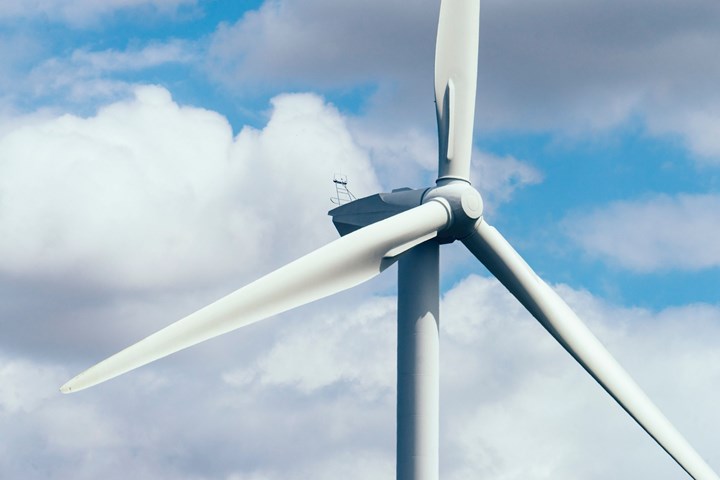Arkema wins Pierre Potier Prize for Elium thermoplastic resin
Following a depolymerization, purification and reformulation process, the resulting Elium thermoplastic resin is said to enable the manufacture of 100% recyclable wind turbine blades.

Photo Credit: Arkema
On Oct. 26, in the presence of Agnès Pannier-Runacher, Minister Delegate for Industry attached to the Minister for the Economy, Finance and the Recovery, Arkema (Colombes, France) was awarded the 2020 Pierre Potier Prize for its Elium liquid thermoplastic resin, an innovation that enables the manufacture of 100% recyclable wind turbine blades.
Created in 2006 by the Ministry for the Economy, Finance and Industry and now sponsored by the Maison de la Chimie Foundation and France Chimie, the Pierre Potier Prize highlights and rewards initiatives in the field of
chemistry that promote sustainable development as well as the development of eco-responsible approaches in the sector. Awarded by a jury of research, industry and ministry experts, this award has become an important
reference for business support organizations.
This year’s winning development, Elium liquid thermoplastic resin, was developed in Arkema’s research center in southwestern France, and is said to be the first resin that enables the manufacture of fully recyclable wind turbine blades. During the process, blade parts are first ground and then heated to depolymerize the resin so that it can be separated from the fiber filler. After purification and reformulation, says Arkema, a new liquid thermoplastic resin is obtained with the same characteristics as the virgin resin. The prize corresponds with Arkema’s partnership with the ZEBRA (Zero wastE Blade ReseArch) consortium led by IRT Jules Verne, which aims to create the first 100% recyclable wind turbine blade and to contribute to the development of environmentally friendly and sustainable solutions for wind power.
Beyond the wind power market, Elium resin is said to enable the production of a wide variety of glass fiber or carbon fiber-reinforced thermoplastic parts of all sizes and with complex shapes. Its economic benefit comes from two major characteristics: its ease of implementation with short hardening times at room temperature and its compatibility with the numerous technologies for processing existing thermosetting resins, thus limiting investments for fabricators already equipped with these machines and opening up a vast range of developments in many sectors such as transportation, construction and the boating industry.
Arkema notes that it has already received the Pierre Potier Prize in previous years:
- In 2016, for its Kynar fluorinated polymer with durable hydrophilic properties for the manufacture of hollow fibers used in ultrafiltration modules for water purification.
- And in 2013, for its high-temperature polymer Rilsan-HT, what the company contends is the first thermoplastic in the polyphthalamide (PPA) family, produced up to 70% from castor oil and used as a replacement for metal or rubber in under-the-cowl automotive applications.
Related Content
-
Composites end markets: Electronics (2024)
Increasingly, prototype and production-ready smart devices featuring thermoplastic composite cases and other components provide lightweight, optimized sustainable alternatives to metal.
-
Recycling hydrogen tanks to produce automotive structural components
Voith Composites and partners develop recycling solutions for hydrogen storage tanks and manufacturing methods to produce automotive parts from the recycled materials.
-
Novel composite technology replaces welded joints in tubular structures
The Tree Composites TC-joint replaces traditional welding in jacket foundations for offshore wind turbine generator applications, advancing the world’s quest for fast, sustainable energy deployment.
















